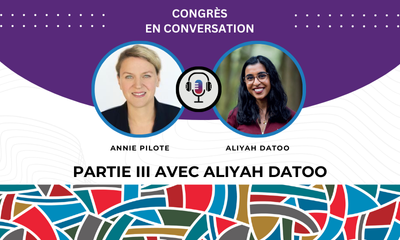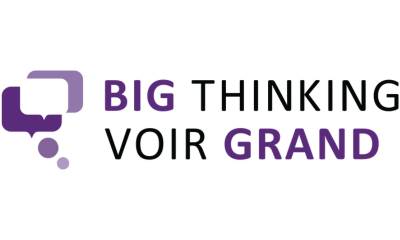REGINA, May 28, 2018 — Researchers from Simon Fraser University and UBC examine the transformation that podcasting is having on university, others look at the dangers posed by mis/disinformation, all as part of the Congress of the Humanities and Social Sciences. Canada’s largest academic gathering, Congress brings over 5,000 of the country’s brightest researchers, thinkers, and policy-makers to the University of Regina this week.
Unique to Canada and often called the “Academic Olympics,” Congress is great fodder for journalists looking for fresh research stories in the humanities and social sciences.
Programming highlights in news and journalism at this year’s event include:
Podcasting and the Transformation of Scholarly Communication: This roundtable brings together four speakers to discuss the role podcasting might play in making scholarship more accessible to wider audiences. Current models of scholarly communication significantly impede public engagement and thus the possibility for our research to impact policies. Podcasting presents a viable way to make research more accessible. This roundtable will consider some of the different scholarly podcasting projects that already exist, barriers to making this practice more common and widespread, and what we think the future of scholarly podcasting might look like. Researchers on the University of Regina campus this week.
The Media, Trumpism, and Liberalism Collide in the 21st Century: Modern media has expanded from newspapers and magazines, into new media platforms and practices that are becoming multinational and global in scope. A panel of researchers will discuss how the voices of diverse Canadian and American perspectives are represented, or not, in today’s changing media landscape. May 29 in Classroom CL 136 at 8:30 am.
The Problem of “Fake News”: Media, History, and Democracy: In today’s world, how do we reconcile fact from fiction? Misinformation threatens our ability to inform ourselves as citizens. How do we reconcile the role of media—which is essential to transparency, good governance and democracy—with social media networks, business objectives and the needs of citizens to be accurately and properly informed? This panel brings together a journalist, a professor and an archivist to shed light on the problem of “fake news” and its implications for media, democracy, and history. May 29 in ED 612 at1:30 pm.
Audiences Perceptions of House of Cards. The Role of Transportation and Identification: Media have been accused of manipulating the public, framing information strategically, to the point of creating cynical audiences. This research explores the effects of a particular media product, the political TV show House of Cards. It indicates that people watching this series believe they understand politics better and have higher interest in politics because of it. This might have serious implications - people might tune off news if they have the feeling they might get political information and cues from fictional series (while also being entertained). June 1 in Classroom - CL 434 at 1:30 pm.
Congress is an annual gathering of more than 65 scholarly associations, each holding their annual conference under one umbrella. This year’s theme is “Gathering Diversities”, reflecting the history of Regina as a traditional place of gathering and rich buffalo hunting grounds for Plains cultures.
Congress is open to the public. More information about the Federation and Congress 2018 is available online through their website, Twitter and Facebook.
-30-
For interview requests
Federation for the Humanities and Social Sciences
Nicola Katz
Manager of Communications
nkatz@ideas-idees.ca
Cell: 613-282-3489
University of Regina
Dale Johnson
Communications Strategist
dale.johnson@uregina.ca
Cell: 306-531-5995
About the Congress of the Humanities and Social Sciences
Organized by the Federation for the Humanities and Social Sciences, Congress is the largest interdisciplinary conference in Canada, and one of the largest in the world. Now in its 87th year, Congress brings together academic associations that represent a rich spectrum of disciplines in the humanities and social sciences, including literature, history, theatre, film studies, education, music, sociology, geography, social work and many others. Congress 2018 is hosted by the University of Regina. For more information, visit www.congress2018.ca.
About the Federation for the Humanities and Social Sciences
The Federation for the Humanities and Social Sciences promotes research and teaching for the advancement of an inclusive, democratic and prosperous society. With a membership now comprising over 160 universities, colleges and scholarly associations, the Federation represents a diverse community of 91,000 researchers and graduate students across Canada. The Federation organizes Canada’s largest academic gathering, the annual Congress of the Humanities and Social Sciences. For more information about the Federation, visit www.ideas-idees.ca.
About the University of Regina
The University of Regina is constantly pushing the bounds of knowledge and pioneering new ways of thinking about the world. It’s no surprise that the University is ranked in the Top 200 by Times Higher Education in the Best Young Universities category. At the heart of its success is the institution’s commitment to growing diversity. Since 2009, it has increased its international student population by 122 percent and its Indigenous student population by 84 percent. The University of Regina is home to the country’s highest percentage of graduate students from outside Canada, and has received the top ranking in Canada for its number of international research collaborations. For more information about the University of Regina, visit www.uregina.ca.

Vivre-ensemble
Par Prof. Margrit Talpalaru, professeur.e et responsable académique pour le Congrès 2025 au Collège George Brown Le Collège George Brown (CGB) est le premier établissement d'enseignement supérieur à accueillir le Congrès des sciences humaines au...

Le Congrès en Conversation - Partie III avec Aliyah Datoo
← Page d'accueil du balado Voir Grand Introduction | À propos de l'invitée | La recherche d'Aliyah Datoo au Congrès | Transcription | Suivez nous Introduction Bienvenue au Congrès en Conversation, une série spéciale présentée par le balado Voir...

Faire vivre les communautés politiques
Voir Grand au Congrès 2024 Face aux menaces croissantes qui pèsent sur la démocratie, que peut-on faire pour promouvoir une communauté politique durable? Rejoignez-nous pour une discussion stimulante sur la polarisation politique, l'injustice sociale...
